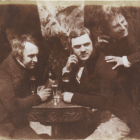The Best Story I Read in a Lit Mag This Week: “Three Small Town Stories” by Dinah Cox
I’ve recently become friends with a new handful of people, and out of this group, one woman in particular. Then, over the last weekend, I got to see some old friends from grad school, and in talking about our lives and the new people we’ve met since we graduated, I got around to explaining what I like about this new female friend—she’s opinionated, loud, full of feelings, unabashed. I always know where I stand with her. She’s got attitude.
In short, I like me some sass. In my fellow humans, but also in stories, which is probably why I was so into Dinah Cox’s “Three Small Town Stories” published in the most recent issue of Salt Hill. This omniscient narrator has opinions! Lay ‘em on me, narrator. I’m ready to go.
The story is in three vignettes: the first, an account of the robbery of a Kentucky Fried Chicken, damaged by a tornado the year prior; the second, a shared afternoon between two high school sweethearts; and the third, a brief history of a man who killed himself.
The narrator approaches the characters in each vignette with a different helping of compassion—there is no unifying, across-the-board desire for fairness or objectivity. This narrator seems to like and feel affection for some characters (such as the couple in the second section, which is the longest), but not as much for others. In the last vignette, the narrator flat out tells us, “The man who killed himself is not to be pitied because he did some terrible things.” Do we still pity him anyway? I did, and the only way I could was because the narrator chose not to name just what horrible things the man did.
When we tell stories, both on the page and in real life, the details we choose to include about a person or event illuminate that subject. But of course, those details reveal us too, how we feel and what we believe. When I try to describe the unpleasantness of a man I used to know, I tend to pick one anecdote to share, since I more or less feel that it embodies what I found difficult and demanding about him. I tell people that he once bragged at a meeting how he paid subway performers not to play music while he waited for the train.
Of all of the gnarly things I can remember this man doing and saying, this moment certainly wasn’t his worst. But still, when I talk about this person, I don’t ever reveal the good, the redeemable. (I don’t say, for example, that he also offered everyone in the office a place to stay after the hurricane came through New York.)
Likewise, the defining moments in the life of Cox’s fictional man who killed himself are selected by the narrator and delivered without apology. There’s almost a harshness in the way the narrator rattles off the details of this man’s life, one after another, in sentences that each begin, “The man who killed himself is.” We get the sense that the narrator has the capacity to be cold and possibly a bit cruel—by listing these details one at a time, giving each the same weight, the narrator reduces the character’s life down to a series of one-off comments.
None of us would describe our lives this way. We like to believe that we’re more than a quick list of our past actions, but the narrator doesn’t indulge this character, doesn’t offer him the space to be anything more than a carefully curated selection of bad behaviors and insecurities—revealing a narrative attitude that I really liked. The narrator doesn’t try to be objective and doesn’t cater to us. “This is how I think things are,” the narrator seems to say. “Take it or leave it.”
Of course, an argument could be made that all narrators, even those third-person omniscient narrators who seem as impartial as can be, are just as biased as the narrator here. But when I approach fiction written from this point of view, I tend to believe that I’m being told an objective version of the story’s events. (Is that possible? Perhaps not.)
But the narrator in “Three Small Town Stories” exposes its preferences, judgments, and convictions, which made me want to read on. Does the narrator like small towns and the people who live in them? I’d say maybe not. (But I’d also venture that this narrator might not love it if someone unfamiliar with small towns decided to talk shit about them and their inhabitants.)
The most forgiving the narrator gets is, as I mentioned, in the second vignette, a scene between two characters young enough to possibly escape their small-town lives, and only here does the narrator seem to pull back, to give these two college students the room needed to see them as full people with complicated lives. Contrasted with the first and last vignette, the narrator’s decision to let us linger only gives a heightened impression that it has opinions it’s not afraid to dish out.
So check out “Three Small Town Stories” by Dinah Cox. This issue of Salt Hill overall is pretty fantastic (there’s an interview with Mary Karr and George Sanders, along with gorgeous art from Anthony Goicolea), and you can find it here.
“The Best Story I Read in a Lit Mag This Week” is a series focused on—you guessed it—great pieces of fiction in recent issues of literary journals. Have a journal you think I should check out? Tell me about it in the comments or shoot me an email at lymreese at gmail dot com.



